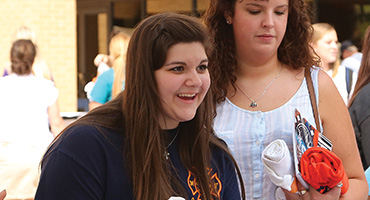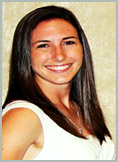
Mathematics BS Degree
A Math Degree is Your Gateway to Multiple Career Paths
Completing your bachelor’s degree in mathematics at The University of Texas at Tyler can give you an exceptional career advantage in a wide range of fields including management consulting, information technology (IT), engineering, biotechnology, cryptography, actuarial science, statistics, finance and education. College graduates with math competency are highly sought after by employers nationwide.
- Study mathematics in a well-rounded degree program that encompasses algebra, real analysis, applied math, and probability and statistics.
- Earn your math degree and find immediate employment or go on to graduate studies in mathematics right after graduation.
Graduates of the mathematics bachelor’s program have found employment in such organizations and businesses as Fairfield-Nobel, NASA and Whitehouse Independent School District. Others have entered PhD programs at University of Nebraska, University of Utah and University of Texas at Arlington.
Learn more from the Department of Mathematics.
Bachelor’s in Mathematics: Well-Rounded. Rigorous.
- Study in the math department’s modern facilities, featuring computer labs, tutoring areas and computerized classrooms.
- Pursue certification to be able to teach mathematics (grades 8-12) in Texas public schools.
- Participate in top mathematics conferences hosted by The University of Texas at Tyler on campus. Events have included the Texas Undergraduate Mathematics Conference, the 45th annual Spring Topology and Dynamical Systems Conference and the annual spring meeting of the Texas Section of the Mathematical Association of America.
More Information
-
Career Outlook for Mathematicians
According to the U.S. Bureau of Labor Statistics, employment opportunities for mathematicians are expected to increase 21 percent through 2024, much faster than the average rate for all occupations.
For more, visit Occupational Outlook Handbook - Mathematicians.
800 UT Tyler
903.566.7203
enroll@uttyler.edu
Admissions Home Page
Mathematics Courses: Challenging. Analytical.
-
Abstract Algebra I
Undertake the study of groups, rings, fields and vector spaces.
-
Foundations of Mathematics
Explore elementary logic, intermediate set theory, relations, functions and countable number systems.
-
Introduction to Complex Variables
Study the functions of a complex variable. Emphasis is given to analytic functions, differentiation, integration and series expansions.
Learn more about UT Tyler’s mathematics program of study.

Math Faculty: Student-Focused. Research-Based.
--Benefit from individual attention in small classes led by award-winning educators.
--Study with college professors whose published books and journal articles address mathematical challenges. Faculty articles have included such topics as: New Classic Problems, On a Theorem of Peregudov, Fullerene Patches I and Minimal Lattice Knots.
--Work side-by-side on research with your college professors and present findings at the joint meetings of the American Mathematical Society, the Mathematical Association of America, and the Society for Industrial and Applied Mathematics.
Meet a University of Texas at Tyler Graduate

Calculating Career Options
“Spring 2011 was a whirlwind for me. Just as I was completing work on my bachelor’s degree in mathematics, I found out I was chosen for a fall 2011 graduate teaching assistantship at the University of Nebraska in Lincoln. That means turning in my Patriot blue and orange for Cornhusker red—at least for a while.
“My goal is to complete my master’s degree and ultimately a PhD in mathematics. Then, down the road I may try to find a position working in cryptography with the National Security Agency (NSA) or the U.S. Department of Defense. Of course, I also wouldn’t mind becoming a math professor if that door opens up. There are a lot of possibilities, but right now I’m focusing on the challenge ahead for the fall term.
“I feel so well prepared by the program at UT Tyler. The professors really know how to help a student like me who wants to go on and do bigger things with a math degree. Dr. Jennifer McCloud, my undergraduate research advisor, was especially great to work with, but all the professors were awesome.”
Kristen Chockley, Plano, TX
BS Mathematics, 2011



